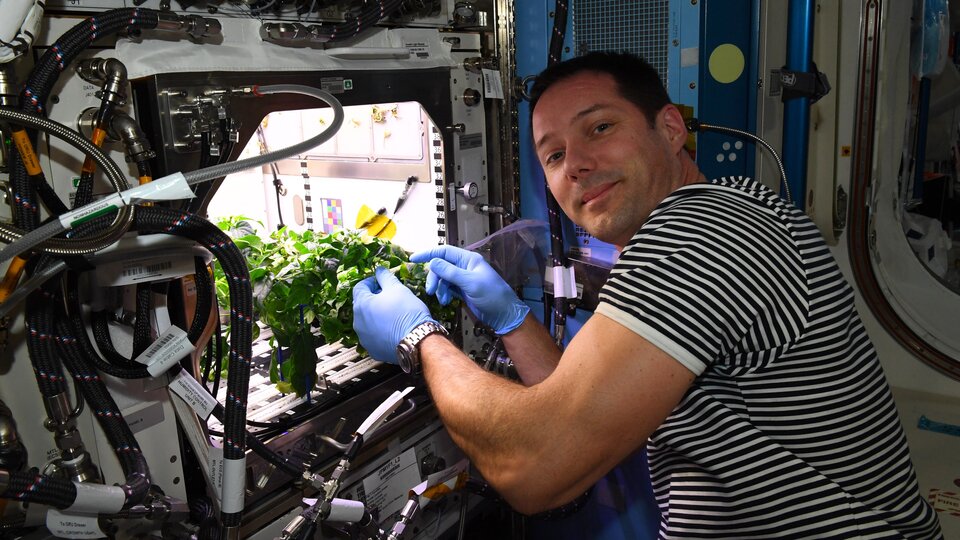2.04.2022

Cultured meat could be a game changer for the environment, food security, human health and animal welfare. But some challenges prevent it from reaching its full potential. Now ESA is supporting researchers to explore the possibility of growing cultured meat to feed astronauts. Overcoming the challenges of growing meat in space could also help us find solutions to produce it sustainably and effectively on Earth.
The idea of feeding astronauts on long-duration missions with cultured meat was initially proposed by ESA engineer Paolo Corradi.
Paolo explains: "For long-term human exploration missions far from Earth, we would need to transport a large amount of long-shelf-life food. This comes with the risk of food becoming degraded over time or even lost, which would significantly limit the degree of self-sustainability and resilience of the mission."
"So, if we want to succeed in long-term human exploration far from Earth, we need to rethink our current approach to astronaut nutrition and provide the means to efficiently produce food on board, possibly integrated within the regenerative life support system," continues ESA environment control and life support engineer, Christel Paille, who is working with Paolo on this activity.

"And, of course, the conventional production of animal-based food, as meat, in space would be unthinkable," concludes Paolo.
Industry and academia were invited to apply for fundingfrom the Discovery element of ESA's Basic Activities to develop the concept further.
Two teams were selected to work in parallel; one is composed of young German company yuri and Reutlingen University, and the other of UK companies Kayser Space, Cellular Agriculture and Campden BRI.
Paolo is overseeing the projects on behalf of ESA. He explains how they will proceed: "First, the teams will analyse and compare the nutritional value and potential benefits of cultured meat products with those of protein food alternatives for space applications. Then they will establish a set of requirements for growing meat in space based on the nutritional guidelines for astronauts and selected future human spaceflight missions."

In this second step, the teams will be supported by ESA experts in astronaut nutrition and human spaceflight. This is one example of how this research will involve cooperation between different ESA groups and experts, including the Space Medicine team and Columbus laboratory engineers.
"Finally, the teams will come up with a preliminary design for a cultured meat production system for space applications, assessing its feasibility and analysing its performance," adds Paolo. "They will compare the system with other potential onboard systems for protein food production, and with the current approach which involves food supplies being transported from Earth. They will also assess the potential commercial interest for a promotional demonstrator for both space and ground applications."
Daniela Bezdan, chief science officer of yuri, explains the benefits of this project: "The research activities of our project team on cultured meat were so far exclusively focused on applications on Earth. This project will widen our focus and allow us to transfer elements of our existing work to space applications in follow-up projects. In addition, the results of the study will help draw our attention and research efforts to the most crucial issues regarding the feasibility of cultured meat production."

Kayser Space's programme manager Ramón Nartallo adds: "This project provides us with the opportunity to consider the challenges of life support systems operating beyond low-Earth orbit, in long-duration space missions and different gravity environments. It will also help Cellular Agriculture to deliver a first bioprocess design to enable high-quality protein production, and Campden BRI to develop their knowledge in an exciting emerging field."
Meat production is the cause of environmental problems, facilitates potential pandemic diseases, and causes suffering to billions of animals every year. And with the global population growing and the demand for meat increasing, conventional meat production will become more and more unsustainable.
Cultured meat could make conventional meat a thing of the past, but more research into the production technology is needed. By investigating how cultured meat could be produced in space, where resources are very limited, this research could help advance the technology needed to grow cultured meat more efficiently on Earth.
This contribution to a much-needed food production revolution on Earth fits in with ESA's commitment to the United Nations' Sustainable Development Goals.


